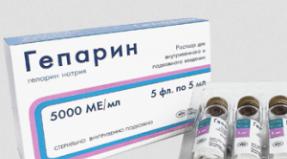Tizine - instructions for use. Dosage and instructions for the use of children's tizine against a runny nose and nasal congestion. Is tizine possible?
Vasoconstrictor drug for local use in ENT practice
Active substance
Release form, composition and packaging
◊ Dosed nasal spray 0.05%
Excipients: - 200 μg, sorbitol 70% - 20 mg, sodium chloride - 4.16 mg, sodium dihydrogen phosphate dihydrate - 3.38 mg, disodium hydrogen phosphate dihydrate - 2.08 mg, disodium edetate - 1 mg, purified water - a sufficient amount.
10 ml (at least 140 doses) - vials of brown hydrolytic glass (class III) (1) with a dosing device and a "pull-off" plastic screw cap - cardboard packs.
◊ Dosed nasal spray 0.1% in the form of a transparent, colorless solution, odorless or with a weak characteristic odor.
Excipients: benzalkonium chloride - 200 μg, sorbitol 70% - 20 mg, - 4.16 mg, sodium dihydrogen phosphate dihydrate - 3.38 mg, disodium hydrogen phosphate dihydrate - 2.08 mg, disodium edetate - 1 mg, purified water - a sufficient amount.
10 ml (at least 70 doses) - vials of brown hydrolytic glass (class III) (1) with a dosing device and a "pull-off" polyethylene screw cap - cardboard packs.
pharmachologic effect
A vasoconstrictor drug for local use in ENT practice. Xylometazoline (an imidazole derivative) is an alpha-adrenergic agonist. Has a vasoconstrictor effect, reduces swelling of the nasal mucosa.
The drug facilitates nasal breathing by reducing swelling and hyperemia of the mucous membrane, and also improves the discharge of secretions.
The effect of the drug occurs within 5-10 minutes.
Pharmacokinetics
At topical application xylometazoline is practically not absorbed, its blood concentrations are so low that they cannot be determined by modern analytical methods.
Indications
- to reduce swelling of the nasopharyngeal mucosa and discharge in acute allergic rhinitis, Acute respiratory infections with rhinitis, sinusitis, hay fever, otitis media;
- preparation of patients for diagnostic manipulations in the nasal passages.
Contraindications
- concomitant use of MAO inhibitors or other drugs that increase blood pressure;
- arterial hypertension;
- tachycardia;
- severe atherosclerosis;
- glaucoma;
- atrophic rhinitis;
- surgical interventions on the meninges (in history);
- children under 6 years of age (for nasal spray 0.1%);
- children under 2 years of age (for nasal spray 0.05%);
- hypersensitivity to the components of the drug.
WITH caution the drug should be prescribed for ischemic heart disease (angina pectoris), hyperplasia prostate, thyrotoxicosis, diabetes mellitus, pheochromocytoma.
Dosage
In the form of a nasal spray, 0.05% is prescribed children aged 2 to 6 years 1 dose in each nasal passage 1-2 times / day.
Xylo in the form of a nasal spray 0.1% is prescribed adults and children over 6 years old 1 dose in each nasal passage 3 times / day.
The dose depends on the individual sensitivity of the patient and the clinical response.
You should not use the drug for more than 5-7 days without a doctor's recommendation.
After completion of therapy, the drug can be re-prescribed only after a few days.
The duration of the use of the drug in children is determined by the doctor.
Rules for using the drug
Remove the protective cap. Before the first use, press the spray nozzle several times until an even cloud of "fog" appears. The bottle is ready to use. When applying, press once. Inhale the drug through the nose. If possible, keep the spray bottle upright. Do not spray horizontally or downward. After use, the bottle should be closed with a cap.
Side effects
Local reactions: burning sensation, paresthesia, sneezing, hypersecretion, in some cases - reactive hyperemia; with frequent and / or long-term use or use in high doses - dryness of the nasal mucosa, burning sensation, reactive congestion with the development of drug-induced rhinitis (this effect can be observed even 5-7 days after completion of treatment). With prolonged use, it is possible to develop dry rhinitis (irreversible damage to the nasal mucosa with the formation of crusts).
From the nervous system: very rarely - headache, insomnia, increased fatigue, depression (with prolonged use in high doses).
Systemic reactions: in isolated cases - palpitations, tachycardia, arrhythmias, increased blood pressure, visual impairment.
Overdose
Symptoms: mydriasis, nausea, vomiting, cyanosis, fever, spasms, tachycardia, arrhythmia, collapse, cardiac arrest, hypertension, pulmonary edema, respiratory disorders, mental disorders, suppression of central nervous system function, accompanied by drowsiness, decreased body temperature, bradycardia, shock-like hypotension, apnea, apnea coma.
Treatment: gastric lavage, the appointment of activated carbon, if necessary artificial respiration with the introduction of oxygen. To lower blood pressure - phentolamine (dissolved in saline) IV slowly at a dose of 5 mg or orally at a dose of 100 mg.
Vasopressor agents are contraindicated. If necessary, antipyretic and anticonvulsants are used.
Drug interactions
With the simultaneous use of the drug Tizin Xylo and MAO inhibitors such as tranylcypromine and tricyclic antidepressants, an increase in blood pressure is possible.
special instructions
Long-term use of the drug and overdose can lead to reactive hyperemia of the nasal mucosa.
Kickback phenomenon can cause obstruction respiratory tract, which leads to the fact that the patient begins to use the drug repeatedly or even constantly. This can lead to chronic swelling (rhinitis medicamentosa) and sometimes even to atrophy of the nasal mucosa (ozena).
In chronic rhinitis, the use of the drug is possible only under the supervision of a physician, given the risk of atrophy of the nasal mucosa.
The drug should not be used in the presence of hypersensitivity to benzalkonium chloride, which is part of the drug as a preservative.
Influence on the ability to drive vehicles and use mechanisms
With long-term treatment or when used in doses exceeding the recommended ones, the possibility of a systemic effect on the cardiovascular system cannot be excluded. In these cases, the ability to manage vehicles or equipment may decrease.
Storage conditions and periods
The drug should be stored out of the reach of children at a temperature not exceeding 25 ° C. Shelf life is 3 years.
Tizin Xylo (INN xylometazoline) nasal spray is an alpha-adrenostimulating agent of the imidazole series. Acts like a stimulus sympathetic nerves... Has a vasoconstrictor effect. Eliminates excess fluid accumulation in the nasal mucosa. Begins to act 5-10 minutes after spraying in the nasal passages. Facilitates inhalation and exhalation through the nose. Reduces excess blood flow to the nasal mucosa. Facilitates the evacuation of secretions. With intranasal use, it is practically not absorbed into the systemic circulation. Tizine Xylo is used as symptomatic remedy to eliminate puffiness and reduce discharge with a cold of allergic genesis, acute respiratory diseases, occurring with profuse rhinorrhea, inflammation of the sinus mucosa, seasonal allergic rhinoconjunctivitis, otitis media, and also as part of preparatory measures before diagnostic procedures in the nasal passages. Tizin Xylo is not used for individual intolerance to xylometazoline, other imidazole derivatives or auxiliary components of the drug, hypertension, heart palpitations, atherosclerosis in advanced stages, glaucoma, ozena, as well as in conjunction with MAO inhibitors or other drugs with a hypertensive effect. V pediatric practice the drug is used from two years of age (at a concentration of 0.05%), six years of age (at a concentration of 0.1%). There is a special contingent of people who, when taking Tizin Xylo, must be under compulsory medical supervision: patients with ischemic disease, prostate adenoma, hyperfunction thyroid gland, diabetes mellitus, as well as persons with hypersensitivity to sympathomimetics, suffering from insomnia and dizziness. Frequency rate of application - three times a day (patients over 6 years old), 1-2 times a day (patients under 6 years old). The dose is determined by the severity of the patient's therapeutic response and the tolerability of the drug.
It is not recommended to use Tizin Xylo for more than 5-7 days without consulting a doctor. At the end of the drug course, after a few days, it is possible to reapply Tizin Xylo or other intranasal vasoconstrictors-decongestants. Long-term use of the drug in children must be mandatorily authorized by the attending physician. Typical unwanted adverse reactions that can develop with the use of Tizin Xylo: irritation of the nasal mucosa, passing by itself without any therapeutic intervention, a burning sensation, tingling, creeping creeps, sneezing and increased rhinorrhea in persons especially sensitive to the action of xylometazoline. In a number of situations, reactive (rebound) hyperemia is possible. Long-term use of the drug in submaximal and maximum doses increases the risk of developing side effects, can lead to a weakening of the therapeutic response and pharmacological rhinitis. The above reactions can develop both during and after the end of pharmacotherapy. In especially severe cases, irreversible destruction of the mucous membrane is possible. Extremely rare side effects - headache, painful lack of sleep, increased fatigue, depressive manifestations. In the medical literature, isolated cases of manifestation of systemic side effects are described: heart palpitations, hypertension, visual disturbances. Tizin Xylo can potentiate the hypertensive effect of MAO inhibitors and tricyclic antidepressants. When the drug is discontinued, the so-called. "The phenomenon of recoil", when the body reacts to the termination of pharmacotherapy with an exacerbation of the pathological process. In the case of Tizin Xylo, this will be an obstruction of the respiratory tract, as a result of which the patient needs constant use of the drug, which in turn is fraught with pharmacological rhinitis and atrophic processes in the mucosa.
Pharmacology
A vasoconstrictor drug for local use in ENT practice. Xylometazoline (an imidazole derivative) is an alpha-adrenergic agonist. Has a vasoconstrictor effect, reduces swelling of the nasal mucosa.
The drug facilitates nasal breathing by reducing swelling and hyperemia of the mucous membrane, and also improves the discharge of secretions.
The effect of the drug occurs within 5-10 minutes.
Pharmacokinetics
When applied topically, xylometazoline is practically not absorbed; its plasma concentrations are so low that they cannot be determined by modern analytical methods.
Release form
Dosed nasal spray 0.05% in the form of a clear, colorless solution, odorless or with a weak characteristic odor.
Excipients: benzalkonium chloride - 200 μg, sorbitol 70% - 20 mg, sodium chloride - 4.16 mg, sodium dihydrogen phosphate dihydrate - 3.38 mg, disodium hydrogen phosphate dihydrate - 2.08 mg, disodium edetate - 1 mg, purified water - a sufficient amount.
10 ml (at least 140 doses) - vials of brown hydrolytic glass (class III) (1) with a dosing device and a "pull-off" plastic screw cap - cardboard packs.
Dosage
Tizin Xylo in the form of a nasal spray 0.05% is prescribed for children aged 2 to 6 years, 1 dose in each nasal passage 1-2 times / day.
Tizin Xylo in the form of a nasal spray 0.1% is prescribed for adults and children over 6 years of age, 1 dose in each nasal passage 3 times / day.
The dose depends on the individual sensitivity of the patient and the clinical response.
You should not use the drug for more than 5-7 days without a doctor's recommendation.
After completion of therapy, the drug can be re-prescribed only after a few days.
The duration of the use of the drug in children is determined by the doctor.
Rules for using the drug
Remove the protective cap. Before the first use, press the spray nozzle several times until an even cloud of "fog" appears. The bottle is ready to use. When applying, press once. Inhale the drug through the nose. If possible, keep the spray bottle upright. Do not spray horizontally or downward. After use, the bottle should be closed with a cap.
Overdose
Symptoms: mydriasis, nausea, vomiting, cyanosis, fever, spasms, tachycardia, cardiac arrhythmia, collapse, cardiac arrest, hypertension, pulmonary edema, respiratory disorders, mental disorders, suppression of the central nervous system, accompanied by drowsiness, decreased body temperature, bradycardia, shock-like , apnea, coma.
Treatment: gastric lavage, the appointment of activated carbon, if necessary, artificial respiration with the introduction of oxygen. To lower blood pressure - phentolamine (dissolved in saline) IV slowly at a dose of 5 mg or orally at a dose of 100 mg.
Vasopressor agents are contraindicated. If necessary, antipyretic and anticonvulsants are used.
Interaction
With the simultaneous use of the drug Tizin Xylo and MAO inhibitors such as tranylcypromine and tricyclic antidepressants, an increase in blood pressure is possible.
Side effects
Local reactions: burning sensation, paresthesia, sneezing, hypersecretion, in some cases - reactive hyperemia; with frequent and / or long-term use or use in high doses - dryness of the nasal mucosa, burning sensation, reactive congestion with the development of drug-induced rhinitis (this effect can be observed even 5-7 days after completion of treatment). With prolonged use, it is possible to develop dry rhinitis (irreversible damage to the nasal mucosa with the formation of crusts).
From the nervous system: very rarely - headache, insomnia, fatigue, depression (with prolonged use in high doses).
Systemic reactions: in isolated cases - palpitations, tachycardia, arrhythmias, increased blood pressure, visual impairment.
Indications
- to reduce swelling of the nasopharyngeal mucosa and discharge in acute allergic rhinitis, acute respiratory infections with rhinitis, sinusitis, hay fever, otitis media;
- preparation of patients for diagnostic manipulations in the nasal passages.
Contraindications
- concomitant use of MAO inhibitors or other drugs that increase blood pressure;
- arterial hypertension;
- tachycardia;
- severe atherosclerosis;
- glaucoma;
- atrophic rhinitis;
- surgical interventions on the meninges (in history);
- children under 6 years of age (for nasal spray 0.1%);
- children under 2 years of age (for nasal spray 0.05%);
- hypersensitivity to the components of the drug.
With caution, the drug should be prescribed for ischemic heart disease (angina pectoris), prostatic hyperplasia, thyrotoxicosis, diabetes mellitus, pheochromocytoma.
Application features
Application during pregnancy and lactation
Xylometazoline should not be used during pregnancy. the effects of this drug on the fetus have not been studied.
It is not known whether xylometazoline is excreted with breast milk... Therefore, it is not recommended to prescribe the drug during breastfeeding.
Application in children
Nasal spray 0.1% is contraindicated in childhood up to 6 years, nasal spray 0.05% is contraindicated in children under 2 years of age.
special instructions
Long-term use of the drug and overdose can lead to reactive hyperemia of the nasal mucosa.
The rebound phenomenon can cause airway obstruction, which leads to the patient using the drug repeatedly or even continuously. This can lead to chronic swelling (rhinitis medicamentosa) and sometimes even to atrophy of the nasal mucosa (ozena).
In chronic rhinitis, the use of the drug is possible only under the supervision of a physician, given the risk of atrophy of the nasal mucosa.
The drug should not be used in the presence of hypersensitivity to benzalkonium chloride, which is part of the drug as a preservative.
Influence on the ability to drive vehicles and use mechanisms
With long-term treatment or when used in doses exceeding the recommended ones, the possibility of a systemic effect on the cardiovascular system cannot be excluded. In these cases, the ability to drive vehicles or equipment may be impaired.
Tizine: instructions for use and reviews
Tizin is an alpha-adrenergic agonist, a decongestant drug for topical use in otolaryngology with a vasoconstrictor, decongestant effect.
Release form and composition
Dosage forms:
- nasal drops 0.05%: opalescent colorless liquid with a transparent structure (10 ml each in a glass dropper bottle of dark color, in a cardboard box 1 bottle);
- nasal drops 0.1%: opalescent colorless liquid with a transparent structure (10 ml in a glass dropper bottle of dark color, in a cardboard box 1 bottle).
The active ingredient of Tizin is tetrizoline, in 1 ml its content is:
- drops 0.05%: 0.5 mg;
- drops 0.1%: 1 mg.
Auxiliary components of 0.05% and 0.1% drops: hypromellose, 70% sorbitol (non-crystallizing), sodium citrate, benzyl alcohol, benzalkonium chloride (17% solution), perfume oil (No. 25768), disodium edetate, cremophor 40 (macrogola glyceryl hydroxystearate), concentrated hydrochloric acid (37%), purified water.
Pharmacological properties
Pharmacodynamics
Tetrizoline contributes to the narrowing of small arterioles localized in the nasal passages, which ensures the elimination of edema and hyperemia of the mucous membranes and a decrease in secretion. The drug restores the patency of the nasal passages and facilitates nasal breathing. The effect of the drug appears 1 minute after its application and lasts up to 8 hours.
Pharmacokinetics
When applied topically, tetrizoline is practically not absorbed, therefore its content in blood plasma is negligible.
Indications for use
According to the instructions, Tizin is indicated to reduce swelling of the nasal mucosa with sinusitis, rhinitis, pharyngitis, hay fever, and for therapeutic or diagnostic measures.
Contraindications
- angle-closure glaucoma;
- dry rhinitis;
- hypersensitivity to the components of the drug.
Application in pediatrics: drops of 0.05% Tizine are contraindicated for children under 2 years of age, drops of 0.1% - for children under 6 years of age.
With extreme caution, after carefully weighing the benefits of therapy and possible risk for the patient, Tizine should be prescribed for severe cardiovascular pathologies (including arterial hypertension, ischemic disease heart, arrhythmia, pheochromocytoma, aneurysm), metabolic disorders (including diabetes mellitus, hyperthyroidism), concomitant use of monoamine oxidase inhibitors (MAO) and other drugs that increase blood pressure; during pregnancy and breastfeeding.
Instructions for the use of Tizin: method and dosage
Tizin drops are intended for instillation into the nasal passage, the procedure is carried out in each nostril.
The action of the drug lasts up to 8 hours, therefore, instillation should not be carried out more often than once every 4 hours.
- drops 0.05%: children aged 2-6 years - 2-3 drops 3-4 times a day;
- drops 0.1%: patients over 6 years old - 2-4 drops 3-5 times a day.
Duration of treatment: children - no more than 3 days, adults - up to 5 days.
After a few days of interruption, the course of therapy can be repeated.
Side effects
- systemic disorders: weakness, headache, nausea, insomnia, sweating, tremors, increased blood pressure(BP), heartbeat, allergic reactions;
- local disturbances: burning sensation of the nasal mucosa, reactive hyperemia; against the background of long-term use - chronic swelling of the nasal mucosa, dry rhinitis; frequent use in high doses - dryness of the nasal mucosa, the development of reactive edema, rhinitis medicamentosa.
Overdose
An overdose or accidental oral intake of Tizin drops can lead to symptoms such as depression of the respiratory center, dilated pupils, increased or decreased blood pressure, impaired heart rate, nausea, vomiting, headache, severe dizziness, fever, shortness of breath, increased sweating, cyanosis, seizures, collapse, coma. Also, in some cases, there are signs of CNS depression.
As therapeutic measures, gastric lavage, intake of activated charcoal, artificial respiration, accompanied by the introduction of oxygen, are recommended. To lower blood pressure, phentolamine is slowly injected intravenously at a dose of 5 mg in saline, or it is taken in tablet form at a dose of 100 mg.
special instructions
Tizine should be used for a short time.
Nasal congestion all night relieves a single application of drops before going to bed. Since tetrizoline has an effect on the central nervous system(CNS), using it before bed can cause insomnia.
Ingestion of drops increases the risk of systemic side effects in young children.
Excessive systemic absorption of the drug can cause depression of the central nervous system, manifested by a decrease in body temperature, drowsiness, hypotension, bradycardia, apnea, coma.
Influence on the ability to drive vehicles and complex mechanisms
With long-term treatment with Tizin, or its use in doses higher than recommended, the risk of developing a systemic effect of tetrizoline cannot be excluded. In the case of diagnosing systemic side effects, it is necessary to avoid driving vehicles and performing other potentially hazardous work that requires increased concentration and immediate psychomotor reactions.
Application during pregnancy and lactation
The use of Tizin in pregnant and lactating women is allowed only if the intended benefits of treatment significantly outweigh the potential risks to the fetus or child.
Childhood use
Contraindications of Tizin for children: 0.05% drops for children under 2 years old, 0.1% drops - for children under 6 years old.
Drug interactions
Tetrizoline potentiates the vasoconstrictor effect of MAO inhibitors and tricyclic antidepressants, therefore, with simultaneous use in a patient, an increase in blood pressure is possible.
Analogs
Terms and conditions of storage
Keep out of the reach of children.
Store at temperatures up to 25 ° C.
The shelf life is 5 years.
Tizine is a drug with a vasoconstrictor effect that reduces swelling of the inflamed nasal mucosa, facilitates nasal breathing and improves discharge of secretions.
The active ingredient is tetrizoline.
Dosage forms:
- nasal drops 0.05%: opalescent colorless liquid with a transparent structure (10 ml each in a glass dropper bottle of dark color, in a cardboard box 1 bottle);
- nasal drops 0.1%: opalescent colorless liquid with a transparent structure (10 ml in a glass dropper bottle of dark color, in a cardboard box 1 bottle).
Tizine constricts the small arterioles in the nasal passages, while eliminating the swelling of the mucous tissues and reducing the secretion. As a rule, the effect of using drops occurs within 1 minute after application and lasts up to 8 hours.
Indications for use
What does Tizine help from? According to the instructions, nasal drops are prescribed in the following cases:
- Swelling of the nasal mucosa (in patients with rhinitis, pharyngitis, sinusitis, hay fever, as well as to reduce swelling of the nasal mucosa if necessary for diagnostic and therapeutic measures);
- preparation for diagnostic manipulations in the nasal passages.
Indications for eye drops:
- conjunctival edema,
- secondary hyperemia in allergic eye diseases,
- irritation of the conjunctiva,
- catarrhal conjunctivitis.
Instructions for use Tizin, dosages
It is used intranasally, i.e. instilled into the nasal passages with the head slightly tilted back. Adults and children over the age of 6 are advised to instill 2 to 4 drops of Tizine 0.1% into each nostril.
For children from 2 to 6 years old, Tizine is used at a concentration of 0.05% - a dosage of 2 to 3 drops in each nostril.
The maximum duration of drug treatment should not exceed 5 days for adult patients and 3 days for children.
Although the use of drops before bedtime is considered an effective measure to eliminate nasal congestion throughout the night, the instructions for use warn that Tizine can provoke insomnia, since it affects the human nervous system.
Eye drops Tizine
Instill 1-2 drops into each conjunctival sac 2 to 3 times a day. If there is no improvement within 48 hours of using the drops, further use should be stopped and a doctor should be consulted.
Tizin Xylo and Bio
Spray 0.05% is prescribed for children aged 2 to 6 years, 1 dose in each nasal passage 1-2 times a day.
Tizin Xylo and Bio in the form of a nasal spray 0.1% is prescribed for adults and children over 6 years of age, 1 dose in each nasal passage 3 times a day.
The dose depends on the individual sensitivity of the patient and the clinical response. You should not use the drug for more than 5-7 days without a doctor's recommendation.
After completion of therapy, the drug can be re-prescribed only after a few days.
special instructions
The contents of an open bottle of Tizine should be used within 4 weeks.
Long-term use and overdose should be avoided, especially in children.
If an eye disease is not an obstacle to wearing contact lenses, they should be removed before instilling the drug and installed after about 15 minutes. Avoid direct contact of eye drops with soft contact lenses given the risk of violating their transparency.
Side effects
The instruction warns of the possibility of developing the following side effects when prescribing Tizine:
Locally - reactive hyperemia, burning sensation, chronic swelling of the nasal mucosa (with prolonged use);
Rarely - palpitation, headache, tremors, weakness, sweating, increased blood pressure.
Contraindications
It is contraindicated to prescribe Tizine in the following cases:
- angle-closure glaucoma;
- dry rhinitis;
- hypersensitivity to the components of the drug.
Application in pediatrics: drops of 0.05% Tizine are contraindicated for children under 2 years of age, drops of 0.1% - for children under 6 years of age.
With extreme caution, after carefully comparing the benefits of therapy and the possible risk to the patient, Tizine should be prescribed for severe cardiovascular pathologies (including arterial hypertension, coronary heart disease, arrhythmia, pheochromocytoma, aneurysm), metabolic disorders (including diabetes mellitus, hyperthyroidism), concomitant use of monoamine oxidase inhibitors (MAO) and other drugs that increase blood pressure.
With caution during pregnancy and breastfeeding.
Overdose
Signs of overdose are expressed in the form of increased local side effects and systemic reactions:
- dizziness and headache;
- drowsiness;
- depression;
- tachycardia;
- increased blood pressure;
- visual impairment;
- addiction and drug dependence.
If signs of overdose develop, stop using the spray and consult a doctor. If necessary, the patient undergoes symptomatic treatment.
Analogues Tizin, price in pharmacies
If necessary, you can replace Tizine with an analogue for the active substance - these are drugs:
- Berberyl H;
- Vizin Classic;
- VisOptician;
- Montevizin;
- Octylia.
When choosing analogs, it is important to understand that the instructions for the use of Tizin, the price and reviews for drugs of a similar action do not apply. It is important to consult a doctor and not make your own replacement of the drug.
Price in Russian pharmacies: Tizin classic 0.05% fl. 10 ml - from 92 to 120 rubles, the price of Tizin Xylo nasal spray 0.05% 10ml - from 88 to 129 rubles, according to 586 pharmacies.
Keep out of the reach of children. Store at temperatures up to 25 ° C. The shelf life is 5 years.
Terms of dispensing from pharmacies - without a prescription.
Table of contents [Show]
In this article, you can read the instructions for use medicinal product Tizine... The reviews of site visitors - consumers of this medicine, as well as opinions of doctors of specialists on the use of Tizin in their practice are presented. A big request to more actively add your reviews about the drug: whether the medicine helped or did not help get rid of the disease, what complications and side effects were observed, which may not have been declared by the manufacturer in the annotation. Tizin's analogs in the presence of available structural analogs. Use for the treatment of rhinitis in adults, children, as well as during pregnancy and lactation. Composition of the preparation.
Tizine- sympathomimetic. When applied topically, it causes a vasoconstrictor effect, which develops after a few minutes and persists for a long time.
Tizin Xylo Bio - vasoconstrictor for topical application in ENT practice. Xylometazoline (imidazole derivative) - alpha-adrenergic agonist, narrows blood vessels mucous membrane of the nasal cavity, eliminating edema and hyperemia of the mucous membrane. Facilitates nasal breathing with rhinitis. Hyaluronic acid, which is part of the drug, has a moisturizing effect when used in nasal medicines due to its ability to keep the mucous membranes moist and create optimal conditions for recovery processes.
The action usually develops within 5-10 minutes.
Composition
Tetrizoline + excipients (Tizin).
Xylometazoline hydrochloride + excipients (Xylo and Xylo Bio).
Pharmacokinetics
When applied topically, systemic absorption is low.
Indications
- minor eye irritation;
- itching, edema and hyperemia of the conjunctiva;
- burning, lacrimation, injection of the sclera, due to chemical and physical factors(dust, cosmetics, swimming in chlorinated water, exposure to bright light);
- allergic conjunctivitis;
- to reduce swelling of the nasopharyngeal mucosa and discharge in acute allergic rhinitis, acute respiratory infections with rhinitis, sinusitis, hay fever, otitis media;
- preparation of patients for diagnostic manipulations in the nasal passages.
Forms of issue
Nasal drops 0.1%.
Nasal spray 0.05% and 0.1% (Tizin Xylo and Xylo Bio).
Instructions for use and method of use
Nasal spray
Tizin Xylo and Bio in the form of a nasal spray 0.05% is prescribed for children aged 2 to 6 years, 1 dose in each nasal passage 1-2 times a day.
Tizin Xylo and Bio in the form of a nasal spray 0.1% is prescribed for adults and children over 6 years of age, 1 dose in each nasal passage 3 times a day.
The dose depends on the individual sensitivity of the patient and the clinical response.
You should not use the drug for more than 5-7 days without a doctor's recommendation.
After completion of therapy, the drug can be re-prescribed only after a few days.
The duration of the use of the drug in children is determined by the doctor.
Rules for using the drug
Remove the protective cap. Before the first use, press the spray nozzle several times until a uniform cloud of "fog" appears. The bottle is ready to use. When applying, press once. Inhale the drug through the nose. If possible, keep the spray bottle upright. Do not spray horizontally or downward. After use, the bottle should be closed with a cap.
Side effect
- transient slight irritation of the nasal cavity (burning) in susceptible people;
- sneeze;
- increased swelling of the nasal mucosa (reactive hyperemia);
- headache;
- insomnia;
- visual impairment;
- fatigue and depression (with prolonged use in high doses);
- palpitations;
- tachycardia;
- arrhythmia;
- increased blood pressure.
Contraindications
- concomitant use of MAO inhibitors or other drugs that increase blood pressure;
- tachycardia;
- glaucoma;
- atrophic rhinitis;
- surgical interventions on the meninges (in history);
- thyrotoxicosis;
- patients with severe cardiovascular diseases (for example, ischemic heart disease (including angina pectoris), tachycardia, arterial hypertension, severe atherosclerosis);
- patients with a history of surgical interventions on the meninges;
- children under 6 years of age (for nasal spray 0.1%);
- children under 2 years of age (for nasal spray 0.05%);
- hypersensitivity to any component of the drug.
Application during pregnancy and lactation
Xylometazoline should not be used during pregnancy. impact on the fetus in clinical research has not been studied.
The drug should not be used during breastfeeding, because it is not known whether the active substance is excreted in breast milk.
special instructions
Long-term use and overdose of sympathomimetics that have a decongestant effect can lead to reactive hyperemia of the nasal mucosa. As a result, there is difficulty in nasal breathing, which leads to the fact that the patient begins to use the drug repeatedly or even constantly. This can lead to chronic swelling (medication-induced rhinitis), and eventually even to atrophy of the nasal mucosa (ozena).
In milder cases, to improve the patient's condition, you can first stop the introduction of sympathomimetic in one nasal passage, and after reducing complaints, continue to inject it into the other nasal passage in order to partially provide nasal breathing.
The patient should be informed that if the medicinal product has become unusable or the expiration date has expired, then it should not be thrown into the wastewater or outside. Place the medicine in a bag and put it in the trash can. These measures will help protect the environment.
Influence on the ability to drive vehicles and use mechanisms
With prolonged treatment or the use of the drug in higher doses, the possibility of its systemic effect on the cardiovascular system cannot be excluded. In such cases, the ability to drive and use equipment may be impaired.
Drug interactions
The simultaneous use of MAO inhibitors such as tranylcypromine or tricyclic antidepressants can lead to an increase in blood pressure due to the cardiovascular effects of these substances.
Analogs of the drug Tizin
Structural analogues for the active substance:
- Berberyl H;
- Vizin;
- Vizin Classic;
- VisOptician;
- Montevizin;
- Octylia.
Analogues for the therapeutic effect (remedies for the treatment of the common cold):
- 4 Wei;
- Abisil;
- AquaMaris;
- Aqualor baby;
- Aqualor norms;
- Artromax;
- Aspirin Complex;
- Bioparox;
- Vibrocil;
- Galazolin;
- Glycodine;
- Grippostad Reno;
- GrippoFlu for colds and flu;
- Derinat;
- Children's Tylenol for colds;
- For the nose;
- Isofra;
- Insti;
- Influnet;
- Coldact;
- Coldar;
- Coldrex MaxFlu;
- Korizalia;
- Xilen;
- Xylometazoline;
- Xymelin;
- Libeksin Muko;
- Lordestine;
- Marimer;
- Mentoclar;
- Morenazal;
- Nazivin;
- Nazol;
- Knoxprey;
- Pinosol;
- Colds;
- Rinzasip with vitamin C;
- Rinonorm;
- Rinopront;
- Rinofluimucil;
- Romazulan;
- Sanorin;
- Snoop;
- Suprastinex;
- Tizin Xylo;
- Tizin Xylo Bio;
- Toff plus;
- Umckalor;
- Farial;
- Pharmazoline;
- Fervex spray for the common cold;
- Physiomer nasal spray;
- Fluifort;
- Fluditek;
- Flucoldex N;
- Fugentin;
- Humer;
- Erdomed;
- Erespal;
- Euphorbium.
In the absence of analogues of the drug for the active substance, you can follow the links below to the diseases for which the corresponding drug helps and see the available analogues for the therapeutic effect.
In 1 ml. Tizine Xylo contains 0.5 mg. or 1 mg. (depending on the form of release of the drug) xylometazoline hydrochloride, as well as such excipients as: disodium edetate, sodium and benzalkonium chloride, disodium and sodium hydrogen phosphate dihydrate, water and sorbitol.
The drug is produced in class III hydrolytic brown glass vials with a nominal volume of 10 ml. For ease of use, the vials are equipped with a specialized pull-off lid, as well as a dosing device.
Tizin Xylo with a concentration of 0.05% of the active substance is designed for about 140 doses, and a drug containing 0.1% xylometazoline- for 70 doses. The drops are a colorless solution that may have a faint characteristic odor.
The medicine has anti-congestive and besides, alpha-adrenomimetic properties.
Drops containing xylometazoline which is derived from imidazole refer to sympathomimetic drugs. Tizin Xylo possesses alpha adrenergic properties and has vasoconstrictor effect thereby reducing swelling of the mucous membranes... The drug improves the condition of the mucous membrane, reduces hyperemia, speeds up the passage of secretions and reduces swelling after a maximum of 10 minutes after use.
Tizin Xylo is recommended for use with ARI accompanied by rhinitis(including with an allergic form of the disease), with otitis media and also for sinusitis... In addition, drops are used at the preparatory stage for the upcoming diagnostic examination of patients.
- hypersensitivity;
- hypertension;
- tachycardias;
- atherosclerosis;
- rhinitis of the atrophic type;
- glaucoma.
In addition, Tizin Xylo should not be used while taking MAO inhibitors, as well as medicines that affect the level blood pressure, at the risk of surgical intervention in the area meninges(even a history). With extreme caution, drops should be used when thyrotoxicosis, hyperplasia, at diabetes mellitus, angina pectoris and fechromocytoma.
It is extremely rare when using Tizin Xylo, the following side effects may occur: burning and irritation of the mucous membranes, hypersecretion, and paresthesia and sneezing, hyperemia in hypersensitive patients. With prolonged use, drops may develop rhinitis medication, insomnia strong headache, and depression... In some cases, the use of this medicine may be accompanied by visual impairment, tachycardia, increased blood pressure and arrhythmia.
In accordance with the instructions for the spray Tizine drops are used intranasally. Spray for children (concentration of active compound 0.05%) aged 2 to 6 years, use one dose in each nostril no more than twice a day. Adults, as well as children from 6 years old, can use the drug with a concentration of 0.1%, one dose in each nostril no more than three times a day.
In accordance with the instructions for Tizin Xylo Bio, this type of nasal drops is used according to the above scheme.
It should be noted that an overdose of the drug can occur only if the recommendations for the use and dosage of drops are not followed. In such cases, patients may observe symptoms such as: spasms, drowsiness, nausea, fever, jumps in body temperature, apnea, vomiting and dilated pupils, bradycardia, tachycardia, pulmonary edema, hypotension, arrhythmia, cardiac arrest or collapse, respiratory failure and psyche, coma.
Tizin Xylo is forbidden to be taken together with drugs that affect blood pressure, as well as with MAO inhibitors related to tricyclic or tranylcypromine antidepressants.
OTC dispensing from pharmacies.
At temperatures up to 25 C, in a place difficult for children to reach.
The general shelf life is 3 years.
Drops should be taken under the supervision of a doctor for a chronic form rhinitis. The preparation contains a preservative such as benzalkonium chloride which can cause allergic reactions. At correct application drops do not affect the ability to drive a car or potentially dangerous units and mechanisms, however, with prolonged use, Tizin Xylo can have a negative effect on the cardiovascular system of the body.
Brizolin, For the nose, Galazolin, Nazolin, Influrin, Xylometazolin, Xylen, Xymelin, Hippostad Rino, Zvezdochka NOZ, Pharmazolin, Olint, Nosolin, Otrivin, Rinorus, Snoop, Espazolin, Rinonorm, SanorinO, Xilo AQUA.
Since experts have not conducted scientific research aimed at identifying the effects of this medication on the fetus during pregnancy Tizine Xylo is not recommended for use during this period of time. In addition, these drops should not be used in lactation period since it is not known for certain whether the compounds that make up the drug penetrate into children's organism with mother's milk.
The manufacturer provides two forms of release of Tizin Xylo drops for children: from 2 to 6 years old - dosage 0.05%, over - 0.1%.
Patients using this drug, in most cases, give it a positive characteristic, while noting the effectiveness of the drops and their speed of action. Reviews of Tizin Xylo Bio are also often good.
The price of the spray depends primarily on the form of nasal drops. As a rule, the average price of Tizin Xylo Bio (10 ml bottle) does not exceed 100 rubles.
Tizin Xylo BIO spray 0.05% 10 ml
Tizin Xylo spray 0.05% 10 ml 140 doses
Tizin Xylo nasal spray 0.1% 10ml
Tizin Xylo Bio 0.05% nasal spray 10ml
Tizin Xylo nasal spray 0.05% 10ml
Tizin Xylo Bio 0.1% nasal spray 10ml
Tizine xylo1
Tizine xyloPfizer P.G.M. (France)
Tizin Xylo spray 0.1% 10mlMacNeil
Tizin Xylo spray 0.1% 10mlMacNeil
Tizine, as described by the instructions for use, is recommended to be used to relieve painful symptoms in acute rhinitis and diseases of an otolaryngological nature, accompanied by rhinorrhea and obstruction of the processes of nasal breathing.
Tizin Xilo belongs to pharmacological group vasoconstrictor drugs, the discharge of alpha-adrenergic agonists, local action widely used in ENT practice. Available in two forms:
- Nasal drops.
- Nasal spray.
The principle of action is due to the ability of the active substances to constrict the vessels localized in the nasal cavity. According to medical experts, drops and spray have the following therapeutic properties:
- Vasoconstrictor effect.
- Anti-edematous action.
- Elimination of hyperemia.
- Relief of nasal breathing.
- Moisturizing the mucous membranes of the nasal membranes.
- Activation of processes of a regenerative and regenerative nature.
- Elimination of rhinorrhea.
Thanks to the hyaluronic acid, which is part of the drug, this nasal agent acts gently and delicately, without overdrying or irritating the nasal mucous membranes. The medicine helps to normalize the pressure indicators in the area of the auditory tubes, which can effectively prevent the development of otitis media.
It begins to act a few minutes after the introduction, and it therapeutic effect lasts at least six hours. Despite the fact that the drug is characterized by an exclusively local effect, it should be used with increased caution in small patients. This is due to the increased thinness and permeability of children's mucous membranes of the nasal membranes, which increases the absorption of active substances, and, consequently, the risks of developing undesirable reactions.
What diseases will it help?
- Manifestation of nasal allergic reactions.
- Diseases of viral and bacterial origin, accompanied by nasal congestion, rhinitis and problems with nasal breathing.
- Rhinitis of acute and vasomotor type.
- Pharyngitis.
- Sinusitis.
- Respiratory diseases occurring in acute form.
- Otitis media.
- Hay fever (hay fever).
In addition, due to its pronounced vasoconstrictor and countercurrent effect, Tizin drops are used by otolaryngologists when preparing a patient for diagnostic, therapeutic or surgical measures. In chronic rhinitis, the agent is used extremely carefully and under the strict supervision of a specialist, in order to avoid the development of atrophic changes and possible drug dependence.
Medical professionals strongly discourage the use of Tizin Xylo if the patient has the following health problems:
- Rhinitis of an atrophic nature.
- The presence of angle-closure glaucoma and other severe ophthalmic diseases.
- Increased blood pressure readings.
- Hypertonic disease.
- Arterial hypertension.
- Severe course of atherosclerosis.
- Rapid heartbeats.
- Angina pectoris.
- Diseases of the cardiovascular system, proceeding in a severe form.
- Individual intolerance and hypersensitivity to active substances.
- Previous surgical interventions in the meninges.
- Disorders in the functioning of the thyroid gland.
- Thyrotoxicosis and other diseases of the endocrine system.
- Pheochromocytoma.
- Coronary asthma.
- Dry inflammatory processes, localized in the area of the mucous membranes of the nasal membranes, accompanied by the formation of crusts.
- Enlargement of the prostate.
- Increased indicators of intraocular pressure.
Tizine is contraindicated for the treatment of young patients under the age of two. During pregnancy, there are also restrictions on the use of this medication. Like other nasal vasoconstrictor drugs, this drug is strictly prohibited during the first trimester of pregnancy (to avoid the threat of miscarriage). At other times, expectant and breastfeeding mothers can use Tizin, but only as directed by the attending physician, in minimal dosages and for a limited time!
What side effects can it provoke?
During the therapeutic course with the use of Tizin Xylo, patients may experience the following undesirable reactions:
- Irritation and burning sensation localized in the nasal cavity.
- Development of reactive hyperemia.
- Visual impairment.
- Increase in blood pressure and intraocular pressure.
- Increased fatigue.
- Headache.
- Sleep disturbances.
- Heart rhythm disorders (arrhythmias).
- Increased heart rate (tachycardia).
- Depressive states.
- Dizziness attacks.
- Nosebleeds.
- Paroxysmal sneezing.
Quite rarely, patients begin to show allergic reactions, which are expressed in itching, the appearance of skin rashes, angioedema.
In most cases, the manifestation of the above side effects is due to the presence of contraindications in the patient or prolonged, incorrect use. If any undesirable reactions appear, you must urgently stop using the product and seek professional advice from a qualified specialist!
An acute overdose can develop with the internal use of the drug or against the background of its systematic use, with a permanent excess of the recommended doses (young children are especially susceptible to this). For an overdose, the following painful symptoms are characteristic:
- Arrhythmia.
- Nausea and bouts of vomiting.
- Cyanosis.
- Feverish condition.
- Spasms and convulsive syndrome.
- Respiratory dysfunction.
- Pulmonary edema.
- Increased blood pressure with the threat of a hypertensive crisis.
- Collapse of the circulatory type.

In addition, the active ingredients of Tizine in high concentrations(this is possible with prolonged use of the drug in high dosages) have a suppressive effect on the patient's central nervous system, which leads to the appearance of the following clinical signs:
- Slowdown in heart rate (bradycardia).
- Apnea.
- Decrease in body temperature.
- Hypotonic crisis.
- Increased sleepiness.
- Shock state.
- Hallucinations.
- Shock-like hypotension.
This condition is dangerous with sudden cardiac arrest and the patient falling into a deep coma. If there are signs of an overdose with Tizin, the patient needs to wash the stomach and call qualified medical specialists who will prescribe the necessary symptomatic treatment to the victim. In case of severe overdose, hospitalization of the patient may be required.
Long-term use of Tizin, as well as other vasoconstrictor nasal agents, is fraught with the manifestation of atrophic changes in the mucous membranes of the nasal membranes, the development of chronic edema, hyperemia, and rhinitis of a drug nature. With frequent and prolonged use, the effectiveness medicinal product significantly decreases, therefore, Tizin should be used carefully and in moderation, strictly observing the duration of the therapeutic course recommended by the attending physician!
With the manifestation of signs of drug dependence on Tizin, you need to gradually reduce the dosage of the drug. For a start, it is recommended to inject Tizine only into one of the nasal passages.
Small patients, starting from the age of two, should be instilled 2-3 drops of the drug, one to three times throughout the day. Individual consultation with the attending physician will help to determine the optimal daily dosage for a specific clinical case.
The time intervals between instillation of Tizin should be at least four hours. To increase the effectiveness of the drug, immediately before its administration, it is recommended to thoroughly cleanse the nasal cavity from accumulated mucous secretions. This can be done by blowing the nose or rinsing the nasal cavity.
The optimal duration of the therapeutic course with Tizin is from three to five days. In the presence of certain indications, the specialist can extend the treatment for a few more days, making a mandatory break for a period of 2-3 days.
For the safest and most effective treatment medical specialists suggest following these recommendations:
- Avoid long-term use of Tizine and reduce the daily dosage if signs of improvement appear.
- Use the product with caution before going to bed, as this can provoke the development of insomnia.
- Refrain from taking tricyclic antidepressants and drugs that increase blood pressure during the course of treatment.
- Avoid work that requires increased concentration and attention, since the active ingredients of Tizin can affect the central nervous system and temporarily impair visual function.
The duration of the saving of Tizin is four years. It is recommended to store the product in a place protected from moisture and direct sunlight, as well as inaccessible to small children. It is strictly forbidden to freeze drops!
Tizin Xylo is an effective and popular nasal remedy, the action of which is aimed at facilitating the processes of nasal breathing and the patient's condition with acute rhinitis of various origins. The agent should be used in moderation and only for temporary, symptomatic relief! Long and uncontrolled use of Tizin leads to addiction, the development of drug-induced rhinitis, systemic overdose and other dangerous complications!
Tizine is a well-known nasal spray designed to eliminate the common cold and different forms rhinitis. This medication is not suitable for all patients. To understand in which cases a medicine is prescribed, instructions for the use of a spray in the nose of Tizin will help.
 The medication is produced in the form of a spray with a volume of 10 ml. The composition includes the main component of xylometazoline hydrochloride, as well as auxiliary ingredients. The concentration of the active substance can be 0.05% and 0.1%.
The medication is produced in the form of a spray with a volume of 10 ml. The composition includes the main component of xylometazoline hydrochloride, as well as auxiliary ingredients. The concentration of the active substance can be 0.05% and 0.1%.
A dark glass vial contains a clear liquid with a specific odor. The bottle with the solution is equipped with a special spray nozzle with which the substance is dispensed.
A drug belonging to the category of alpha-adrenergic agonists is intended for irrigation of the nasal passages.
Due to its properties to reduce swelling and relieve inflammation from mucous surfaces, the drug facilitates breathing through the nose and helps to remove purulent mucus.
Spray for the nose Tizin Xylo refers to the means of symptomatic therapy and is not able to eliminate the cause of rhinitis. The vasoconstrictor effect of the drug can be explained by the action of xylometazoline: this component affects the epithelial cells located in the nose and secreting phlegm.
The use of the drug promotes:
- elimination of edema;
- decrease in secretion;
- restoration of breathing through the nose;
- improving general condition sick.
The therapeutic effect occurs within 5 minutes, and can persist for a long time. Local use of the drug practically excludes its absorption in circulatory system.
- sinusitis, sinusitis;
- allergic and vasomotor rhinitis;
- inflammation of the mucous surfaces of the pharynx;
- inflammation of the middle ear;
- hay fever;
- rhinorrhea.
In addition, the doctor can prescribe a medicine during the preparation of the patient for various diagnostic procedures and therapeutic manipulations.
A vasoconstrictor medication is often used for serious pathologies of the upper respiratory system. Tizine with sinusitis successfully relieves swelling and reduces excessive pressure in the nasal cavity. Most often, the spray is prescribed in the preparatory period before the puncture of the maxillary sinuses..
Although active substance the drug acts locally, a small amount of it is able to penetrate into the circulatory system. It is this property that should be taken into account when using the spray during pregnancy.
Tizine for pregnant women can be prescribed if the probable threat to the development of the fetus does not exceed the possible benefit.
At the moment, it is not clear whether xylometazoline is able to penetrate into breast milk. Due to this the substance is not recommended for use during lactation.
It is necessary to use the drug in childhood in a reduced dose - 0.05%... At this concentration, it is approved for use by babies from 2 years old. Tizin Xylo 0.1%, as well as Bio is prescribed for children from 6 years old.
Before purchasing drops, you must first see the pediatrician, who will prescribe the necessary course of treatment and select the appropriate dosage.
Tizin Xylo nose drops are prohibited under the following pathological conditions:
- previous surgery on the brain;
- early age of children under two years old - for a concentration of 0.05%, under 6 years old - for 0.1%;
- cardiopalmus;
- high blood pressure;
- cholesterol deposits on blood vessels;
- increased intraocular pressure;
- rhinitis with mucosal atrophy;
- various hormonal diseases;
- nasal polyps.
Caution must be observed in patients with cardiovascular disease, diabetes, prostate adenoma.
In addition, the product must not be used in conjunction with monoamine oxidase inhibitors and other medicines that increase blood pressure.
Most often, drops are easily tolerated by patients. However, if a person has an individual intolerance to xylometazoline, side effects may occur:
- increased nasal discharge, as well as frequent sneezing;
- mucosal atrophy;
- itching and burning in the nostrils;
- the formation of addiction and addiction to the drug;
- edema of mucous surfaces;
- the appearance of nosebleeds;
- the development of medication rhinitis.
These negative consequences can occur at the end of therapy, even after 1 week.
Long-term use of the drug is often the cause of irreversible changes and dryness of the mucous membranes.
It is extremely rare for patients to observe:
- pain symptoms in the head;
- sleep disturbance;
- increased fatigue;
- depressive state.
Others undesirable consequences heart palpitations, arrhythmias, increased blood pressure, visual disturbances may also become.
To avoid negative manifestations, do not use the drug for more than 7 days., as well as independently increase the recommended dosage.
Too long a course of treatment often leads to an overdose, resulting in increased negative effects. In this situation, the patient needs to cancel the medication and consult with the attending physician. If necessary, a specialist will prescribe symptomatic therapy.
The use of a spray in increased doses often provokes hyperemia of mucous surfaces.... In addition, overdose is the cause of poor performance. of cardio-vascular system... In this case, the patient may experience:
- convulsive syndrome;
- nausea;
- feverish condition;
- dilated pupils;
- cyanosis of the skin;
- swelling of the pulmonary system;
- mental disorder;
- disruption of the heart.
Spray Tizin is intended to be sprayed into the nasal cavity. One press of the bottle corresponds to a single dose of the substance.
Prepare the bottle before first use. To do this, press down on the attachment. During application, the spray bottle is kept strictly in an upright position.
The agent is instilled into the nose, tilting the head back a little. After the procedure, the bottle is closed with a protective cap:
- Nasal drops for children are used at a concentration of 0.05%. At the age of 2 to 6 years, it is allowed to perform one irrigation of each sinus 1-2 times a day.
- Spray 0.1% is recommended for adults and children over 6 years old, 1-2 injections three times a day.
Drops have a long lasting effect, therefore they do not require regular use.
The dose is set individually by the attending physician. In childhood, the medication should not be used for more than 3 days.... The duration of treatment for adults should not exceed 5-7 days.
At the end of the treatment, the agent is allowed to be taken again after a few days.
If there is no positive dynamics, or the patient's condition worsens, you should immediately consult a medical professional.
It should be noted that the use of drops before going to bed can completely eliminate nasal congestion, but can lead to insomnia.
Spray Tizin Xylo is not used in conjunction with drugs-MAO inhibitors, as well as antidepressants. This combination has a negative effect on blood pressure.
Besides, do not use other nasal sprays with a vasoconstrictor effect at the same time as Tizin: the likelihood of developing negative consequences increases significantly.
Drops can be easily purchased over the counter at any pharmacy. Store the medicine out of the reach of children and in a dark place, at a temperature not higher than 25 degrees... The shelf life is 5 years.
When treating chronic rhinitis Tizine increases the risk of atrophic changes in the mucosa... That is why it must be applied under the supervision of a specialist. This condition requires alternating nasal drops and the other drug should not contain xylometazoline.
The medication can cause visual impairment. In this regard, during therapy, it is necessary to refrain from activities associated with increased attention and reaction, work with complex mechanisms as well as vehicle management.
Before instilling the drug, the patient should clear the nasal passages from accumulated mucous secretions.
Currently, there is no data on the effect of the drug with a dosage of 0.05% on children under 2 years of age. It is for this reason that it is not recommended to treat babies with a spray without first consulting a pediatrician.
In pharmacy chains, you can buy 0.05% Tizin Xylo nasal drops at a price of RUB 106, 0.1% at RUB 113, Bio with a moisturizing component is sold at an average cost of RUB 183.
Is it necessary to treat nasal congestion in children? Chronic runny nose can lead to oxygen starvation and malnutrition of brain cells... And constant inflammation in the nasal cavity depresses immune system... Subsequently, this can affect the normal development of the baby, as well as provoke serious complications. That is why doctors recommend timely getting rid of mucopurulent discharge from the nose, and Tizin can help with this.



















